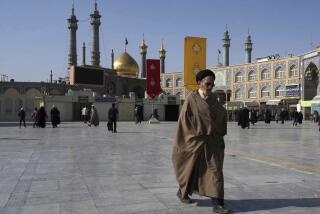Senior Iranian cleric calls for revision of election laws
- Share via
BEIRUT — A senior Iranian cleric called Friday for a revision of election laws to fix “shortcomings” that he said contributed to the nation’s worst political crisis since the first years after the 1979 Islamic Revolution.
Meanwhile, Iranian authorities arrested Kian Tajbakhsh, an Iranian American scholar who previously was jailed and charged with trying to foment dissent in the Islamic Republic.
Ayatollah Mohammad Emami Kashani, a conservative considered part of the old school of clerical establishment, told worshipers gathered for weekly prayers in Tehran that “the law should look into the administration [of the June 12 presidential election], campaigns and possible debates” to spell out rules.
“If those issues are mentioned in the law, many of these tensions will be removed,” he said, in the first Friday prayer sermon since last month that was not led by an avowed hard-liner.
Thousands took to the streets of the capital Thursday in the latest act of civil disobedience to protest President Mahmoud Ahmadinejad’s reelection. The vote was marred by opposition allegations of vote fraud and followed by a sweeping crackdown on dissidents and protesters supporting opposition candidate Mir-Hossein Mousavi.
Security officials arrested Tajbakhsh on Thursday evening at his home in Tehran, human rights groups and friends said. He was taken to an unknown location. A former social science professor at New York City’s New School for Social Research, Tajbakhsh spent months in solitary confinement in Tehran’s Evin Prison in 2007, accused of taking part in a plot to overthrow the Iranian government. He was released after giving a videotaped confession.
Tehran police chief Azizollah Rajabzadeh on Friday dismissed the latest swell of protest as minor.
“The previous night, the police arrested a number of individuals who had provoked people to destroy public property and chant slogans,” he said, according to the Mehr news agency. “The number of these individuals is quite low.”
Rajabzadeh cited one instance of tear gas being fired, even though witnesses and video uploaded to the Internet suggested that it was used extensively to quell crowds that they said numbered in the thousands.
The election issue continues to divide Iran’s political and religious establishment.
“An atmosphere of mistrust dominates the society, and nobody can deny this reality,” said Ayatollah Hashem Hashemzadeh Harisi, a reformist member of the Assembly of Experts, which oversees the office of supreme leader Ayatollah Ali Khamenei, Iran’s highest spiritual and political authority.
“It is up to the system’s highest officials to restore this lost confidence,” he said in a statement that surfaced on websites Friday. “They have to show transparency so that people would feel their leaders are honest. . . . When people lose confidence in their leaders, the world would in turn become mistrustful of the country’s leaders.”
Still, both Harisi and Kashani spoke out in support of Khamenei.
--
More to Read
Sign up for Essential California
The most important California stories and recommendations in your inbox every morning.
You may occasionally receive promotional content from the Los Angeles Times.













